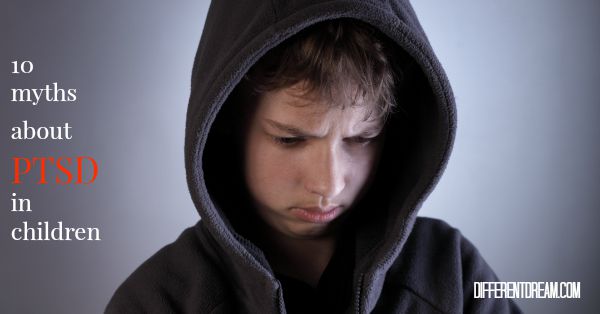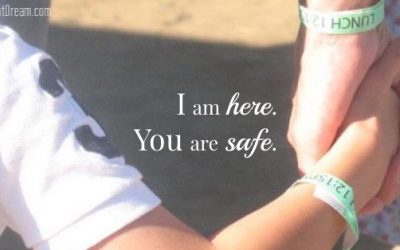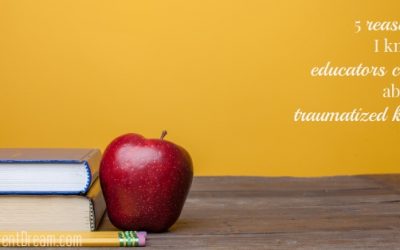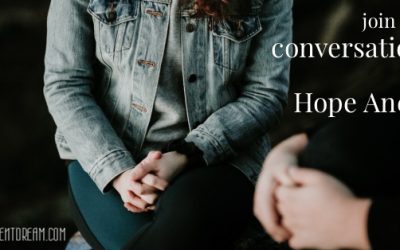10 Myths about PTSD in Children

Thank you for stopping by for the third installment in the series about PTSD in children, also known as childhood developmental trauma. Part 2 in the series provided definitions of trauma, PTSD, and childhood developmental trauma. With that basic understanding of what PTSD in children is, this post looks at what childhood trauma is not by providing a brief look at 10 common myths surrounding PTSD in children.
Myth #1: Only Soldiers Get PTSD
This is probably the most common myth about PTSD in children. But this statement can only be true if war alone causes trauma and if only soldiers are traumatized by war. But since many other events cause trauma and because many civilians living in war zones are traumatized, this myth is obviously untrue.
Myth #2: It’s Not PTSD: It’s Bad Parenting
Kids with PTSD often behave as though they were poorly parented. And parental neglect or abuse can cause PTSD in children. So we tend generalize and pin the blame for behaviors on parents. But sometimes only one sibling raised in a secure, loving, and nurturing home exhibits disturbing behaviors. This scenario reminds us that while pinning the blame on parents is easy and convenient, doing so perpetuates another myth about PTSD in children.
Myth #3: It’s Not PTSD: It’s Willful Disobedience
Like the second myth, this one is based upon pinning the blame on someone–in this case on the child. Once again, the behaviors of kids with PTSD look a lot like willful disobedience or naughtiness. But traumatized children are not deliberately choosing to be naughty. Their behavior is an automatic survival response to something in their environment that triggers a traumatic memory. When that happens, they do whatever it takes to get away from whatever triggered their fear.
Myth #4: It’s Not PTSD: It’s Sin
This myth adds a faith-based spin to the previous one. PTSD behaviors look a lot like willful sin behaviors. But children with PTSD are not deliberately choosing to sin. As was mentioned before, their response is not a rational choice, but an irrational fear response to a perceived threat.
Myth #5: Kids Don’t Remember What Happened When They Were Babies
In fact children, and adults for that matter, do remember what happened when they were babies. But they remember pre-verbal events, from birth to about age 3, as implicit rather than as explicit memories. Implicit memories are stored as emotions, bodily sensations, behaviors, and perceptual interpretations. Explicit memory is what most people think of as memory. Explicit memories, the episodic movies of our lives, begin to kick in around age 2. But implicit memories–both good and bad–are present from birth and help build the foundation of a person’s sense of security…or lack of it.
To read the rest of this post about PTSD in children, visit the Church4EveryChild blog.
Part 1: Writing About PTSD Was Not on My Bucket List
Part 2: Childhood Trauma by Any Other Name Is Still Traumatic
Part 3: 10 Myths about PTSD in Children
Part 4: What Causes PTSD in Children
Part 5: A Look Inside the Brain’s Response to Childhood Trauma
Part 6: Why the Spotlight Is on PTSD in Children
Part 7: Childhood PTSD Symptoms in Tots, Teens, and In Between
Part 8: Why and How Childhood PTSD Is often Misdiagnosed
Part 9: Effective Treatment of PTSD in Children
Part 10: How to Prevent PTSD in Traumatized Children
Part 11: How Parents Can Advocate Effectively for Traumatized Children
Part 12: 4 Reasons Traumatized Kids Need Mentally Healthy Parents
Part 13: Clinging to Faith While Parenting Children with PTSD
Do you like what you see at DifferentDream.com? You can receive more great content by subscribing to the quarterly Different Dream newsletter and signing up for the daily RSS feed delivered to your email inbox. You can sign up for the first in the pop up box and the second at the bottom of this page.
By Jolene
Jolene Philo is the author of the Different Dream series for parents of kids with special needs. She speaks at parenting and special needs conferences around the country. She’s also the creator and host of the Different Dream website. Sharing Love Abundantly With Special Needs Families: The 5 Love Languages® for Parents Raising Children with Disabilities, which she co-authored with Dr. Gary Chapman, was released in August of 2019 and is available at local bookstores, their bookstore website, and at Amazon.
2 Comments
Submit a Comment
Subscribe for Updates from Jolene
Related Posts
I Am Here. You Are Safe.
I am here. You are safe. These 6 words make all the difference for Heesun Hall’s son when his PTSD caused by medical trauma leads to troubled sleep.
Educators Care about Traumatized Kids
This summer, I facilitated trauma training classes for more than 80 educators and realized something very heartening: educators care about traumatized kids.
The Hope Anew Disability Podcast
The Hope Anew Disability Podcast is the latest offering from Jonathan and Sarah McGuire. Learn who it’s for and what it’s about in this post.






Ettina, it is true that parents don’t treat all siblings in the same way. But in that case, the children haven’t been raised in a “secure, loving, and nurturing home.” Because such favoritism isn’t loving and doesn’t provide the security children need. So in a case like that PTSD can be caused by poor parenting. Thanks for your input. Jolene
“But sometimes only one sibling raised in a secure, loving, and nurturing home exhibits disturbing behaviors.”
Sometimes parents act very differently towards different children. Just because they have the same parents doesn’t mean they get the same parenting. This is especially true if the children are different genders or have some other difference (eg one child disabled, the other not; one child LGTB and the other straight, etc).
Plus, some kids are more sensitive than others, or an event hits them at a more sensitive developmental period. (Eg a parent who develops an addiction when her kids are 1, 3 and 5 will have a more adverse effect on the younger siblings.)
I get what you’re intending to say, and yeah, PTSD in children isn’t always the parent’s fault. But differences between siblings don’t always mean that the parents aren’t responsible.